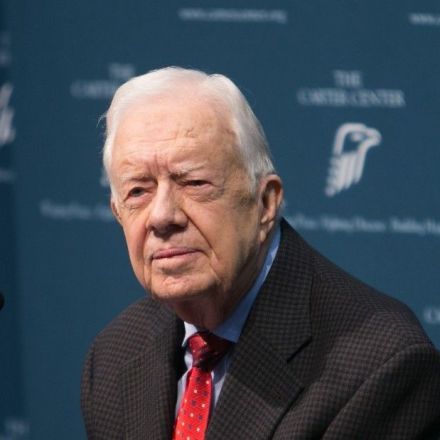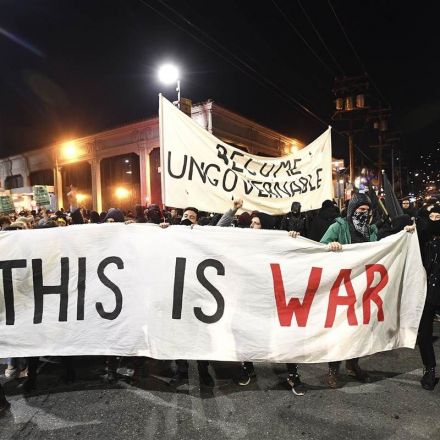

Bernie Sanders Condemns Threats Against Ann Coulter Speech At Berkeley | AllSides
Continue ReadingFreedom of Speech via Wikipedia
Freedom of speech is the right to articulate one's opinions and ideas without fear of government retaliation or censorship, or societal sanction. The term freedom of expression is sometimes used synonymously, but includes any act of seeking, receiving and imparting information or ideas, regardless of the medium used.
The right to freedom of expression is recognized as a human right under article 19 of the Universal Declaration of Human Rights and recognized in international human rights law in the International Covenant on Civil and Political Rights (ICCPR). Article 19 of the UDHR states that "everyone shall have the right to hold opinions without interference" and "everyone shall have the right to freedom of expression; this right shall include freedom to seek, receive and impart information and ideas of all kinds, regardless of frontiers, either orally, in writing or in print, in the form of art, or through any other media of his choice". The version of Article 19 in the ICCPR later amends this by stating that the exercise of these rights carries "special duties and responsibilities" and may "therefore be subject to certain restrictions" when necessary "[f]or respect of the rights or reputation of others" or "[f]or the protection of national security or of public order (order public), or of public health or morals". Therefore, freedom of speech and expression may not be recognized as being absolute, and common limitations to freedom of speech relate to libel, slander, obscenity, pornography, sedition, incitement, fighting words, classified information, copyright violation, trade secrets, non-disclosure agreements, the right to privacy, the right to be forgotten, public security, and perjury. Justifications for such include the harm principle, proposed by John Stuart Mill in On Liberty, which suggests that: "the only purpose for which power can be rightfully exercised over any member of a civilized community, against his will, is to prevent harm to others."The idea of the "offense principle" is also used in the justification of speech limitations, describing the restriction on forms of expression deemed offensive to society, considering factors such as extent, duration, motives of the speaker, and ease with which it could be avoided. With the evolution of the digital age, application of the freedom of speech becomes more controversial as new means of communication and restrictions arise, for example the Golden Shield Project, an initiative by Chinese government's Ministry of Public Security that filters potentially unfavorable data from foreign countries.
The right to freedom of expression includes the right to take and publish photographs of strangers in public areas without their permission or knowledge.
Origins of freedom of speech and expression
Concepts of freedom of speech can be found in early human rights documents. England's Bill of Rights 1689 legally established the constitutional right of 'freedom of speech in Parliament' which is still in effect. The Declaration of the Rights of Man and of the Citizen, adopted during the French Revolution in 1789, specifically affirmed freedom of speech as an inalienable right. The Declaration provides for freedom of expression in Article 11, which states that:
The free communication of ideas and opinions is one of the most precious of the rights of man. Every citizen may, accordingly, speak, write, and print with freedom, but shall be responsible for such abuses of this freedom as shall be defined by law.
Article 19 of the Universal Declaration of Human Rights, adopted in _1948, states that:
Everyone has the right to freedom of opinion and expression; this right includes freedom to hold opinions without interference and to seek, receive and impart information and ideas through any media and regardless of frontiers.
Today, freedom of speech, or the freedom of expression, is recognized in international and regional human rights law. The right is enshrined in Article 19 of the International Covenant on Civil and Political Rights, Article 10 of the European Convention on Human Rights, Article 13 of the American Convention on Human Rights and Article 9 of the African Charter on Human and Peoples' Rights. Based on John Milton's arguments, freedom of speech is understood as a multi-faceted right that includes not only the right to express, or disseminate, information and ideas, but three further distinct aspects:
- the right to seek information and ideas;
- the right to receive information and ideas;
- the right to impart information and ideas
-
Free speech uproar: Debate heats up over Coulter at Berkeley
-
Joe Rogan & Abby Martin on Free Speech and Political Correctness



























Join the Discussion
Re: Joe Rogan & Abby Martin on Free Speech and Political Correctness Somehow Rogan needs to invoke ‘cultural Marxism’ to rail against ideas that bother him. He never realizes, even though Martin leads him by the nose to the edge of the insight, the hypocrisy of this mistaken and profoundly ignorant phrase. It’s Palin-level word salad. But it’s important word salad, he says, because people mean something by it, as if all the things he dismisses as ‘cultural Marxism’ meant nothing. I don’t happen to catch a lot of Rogan’s schtick, and this “political correctness is tyranny while my braying like a jackass is free speech” hypocrisy makes me wanna catch a lot less.